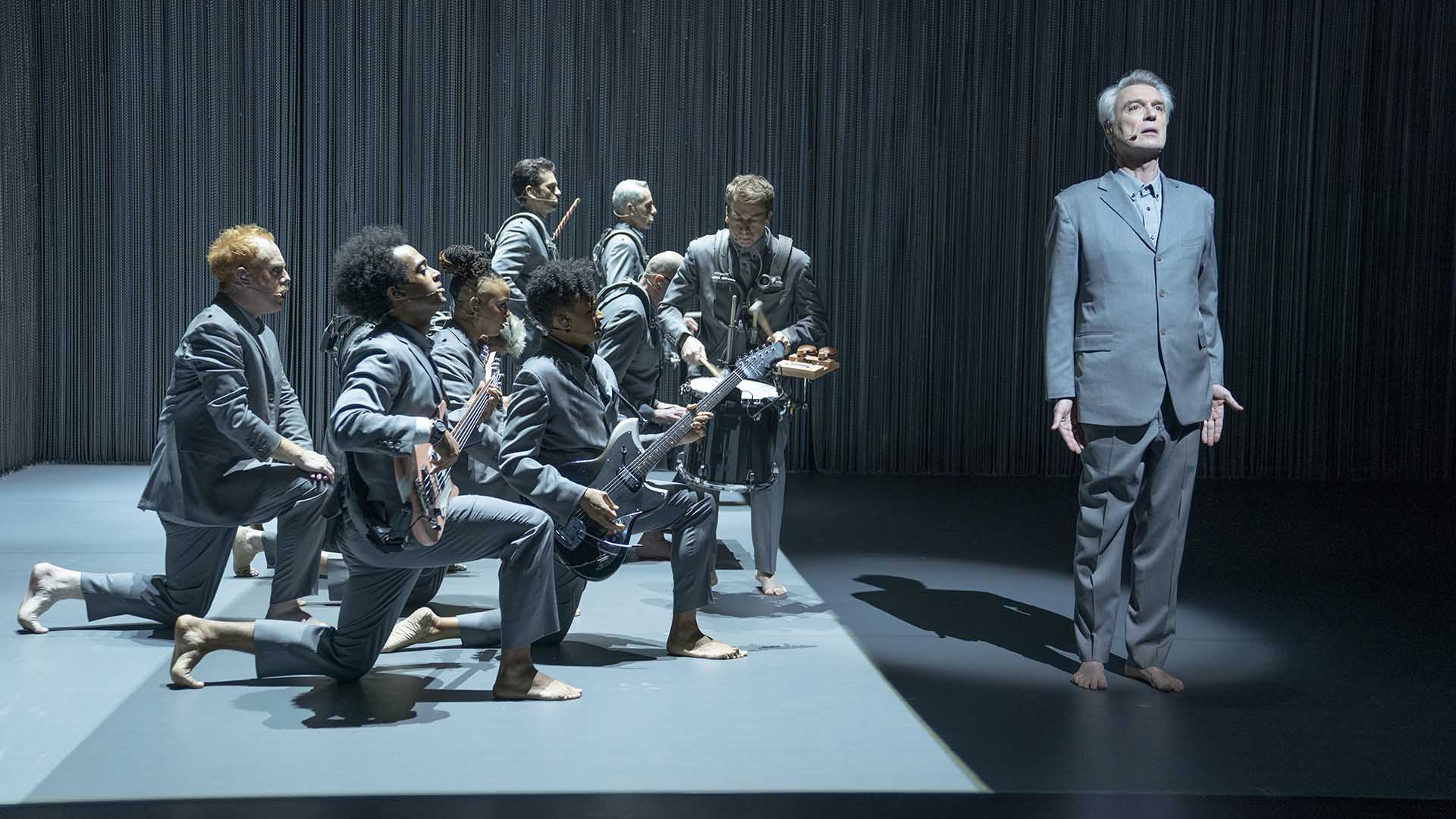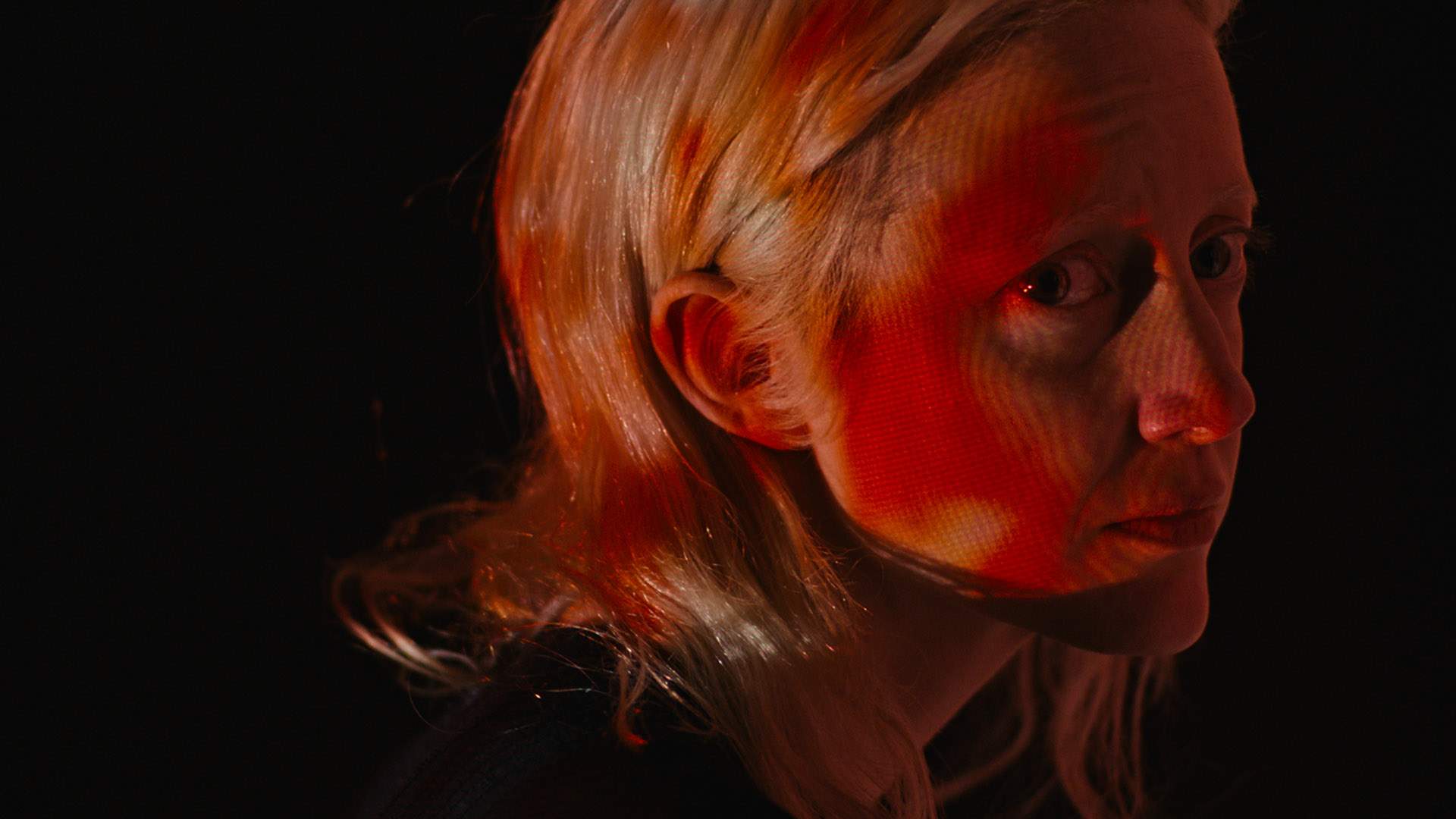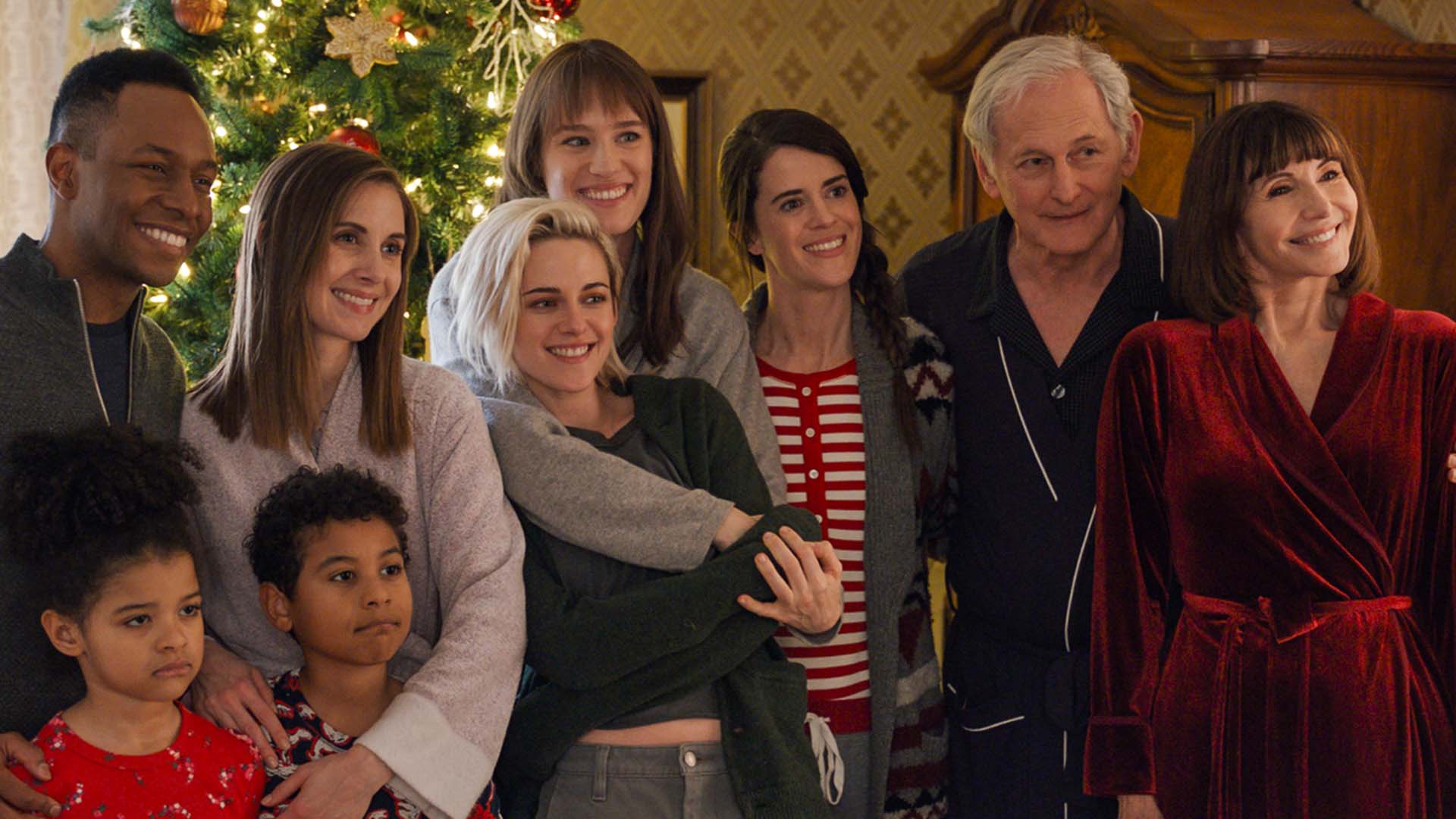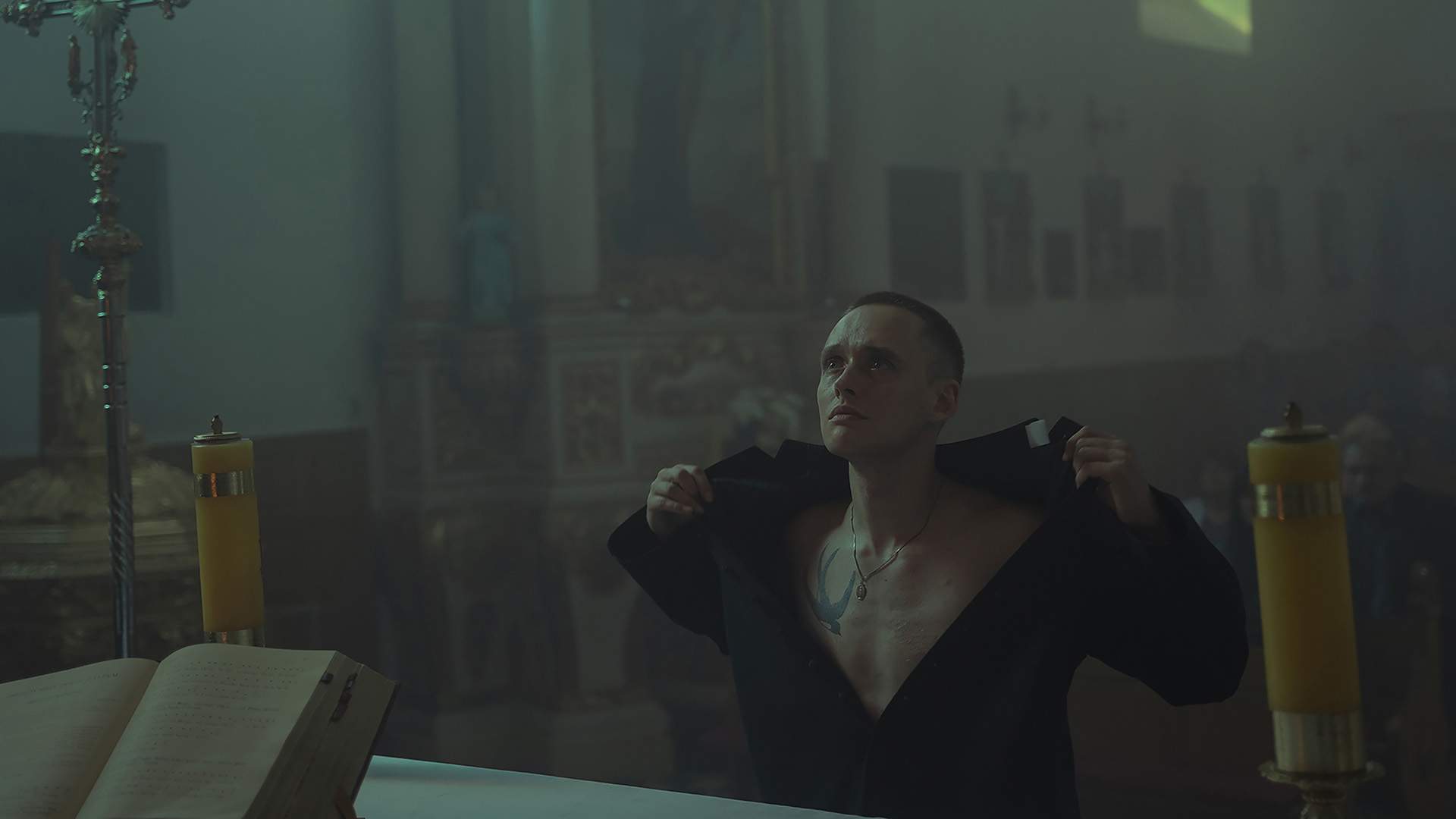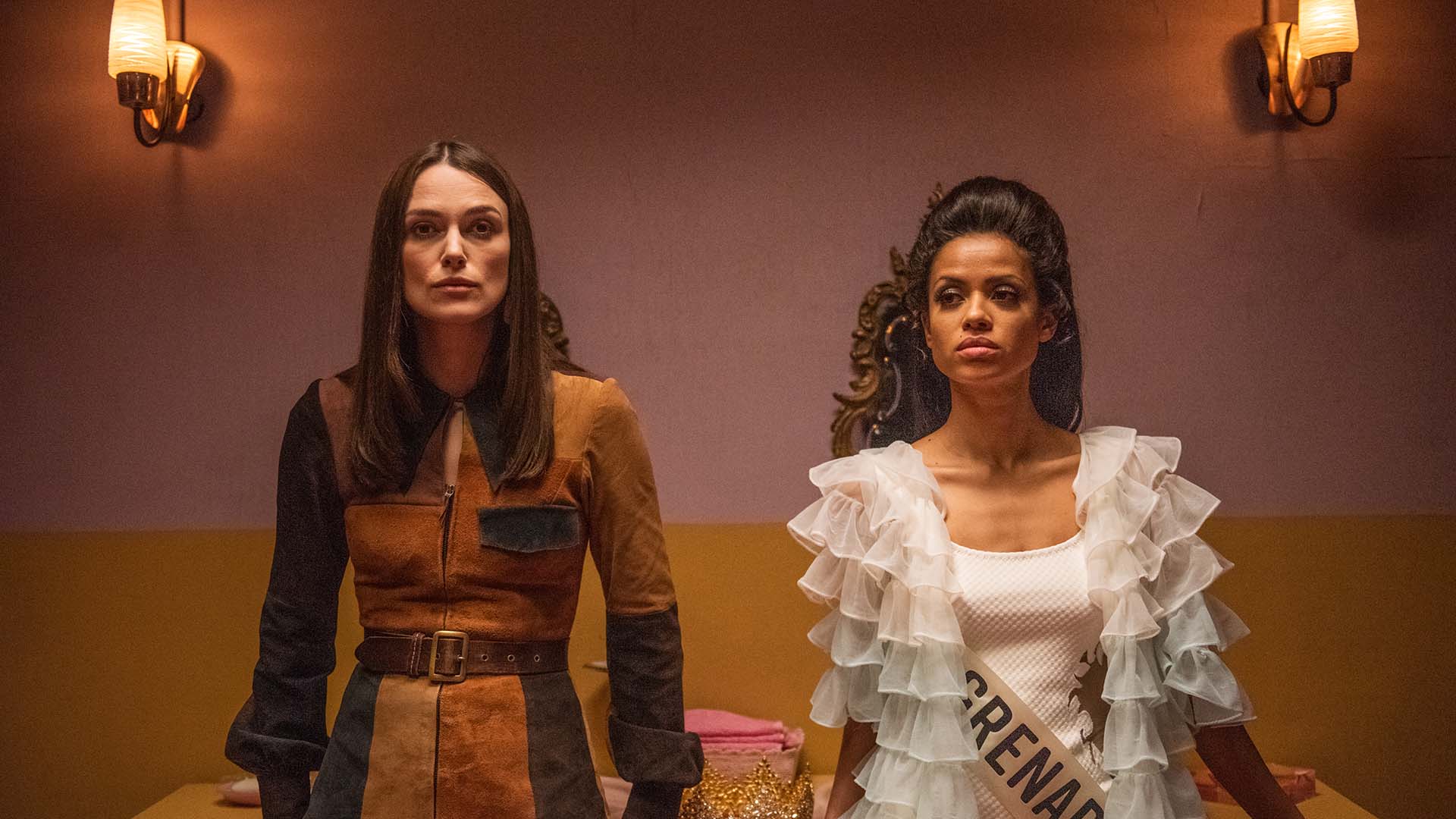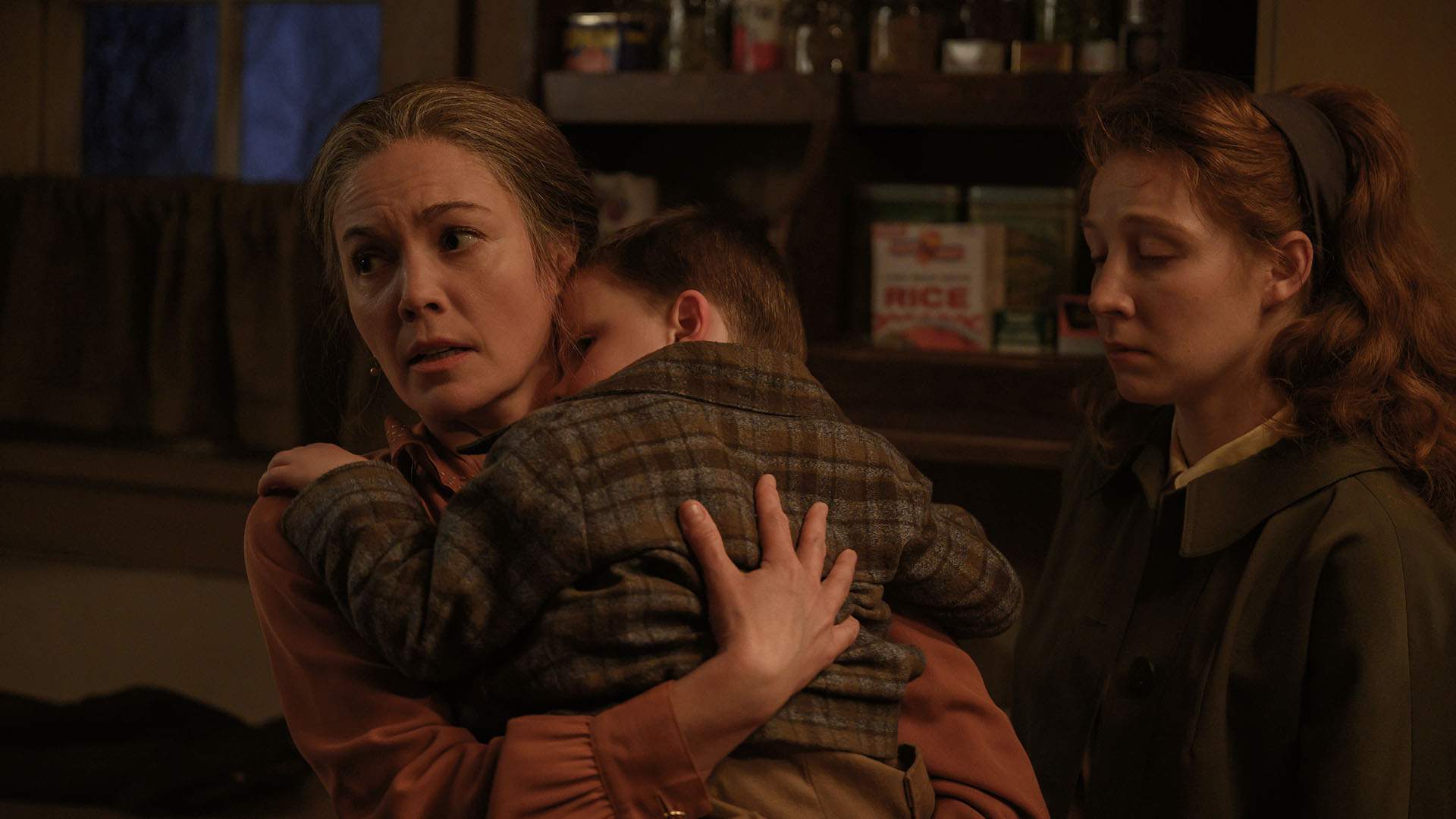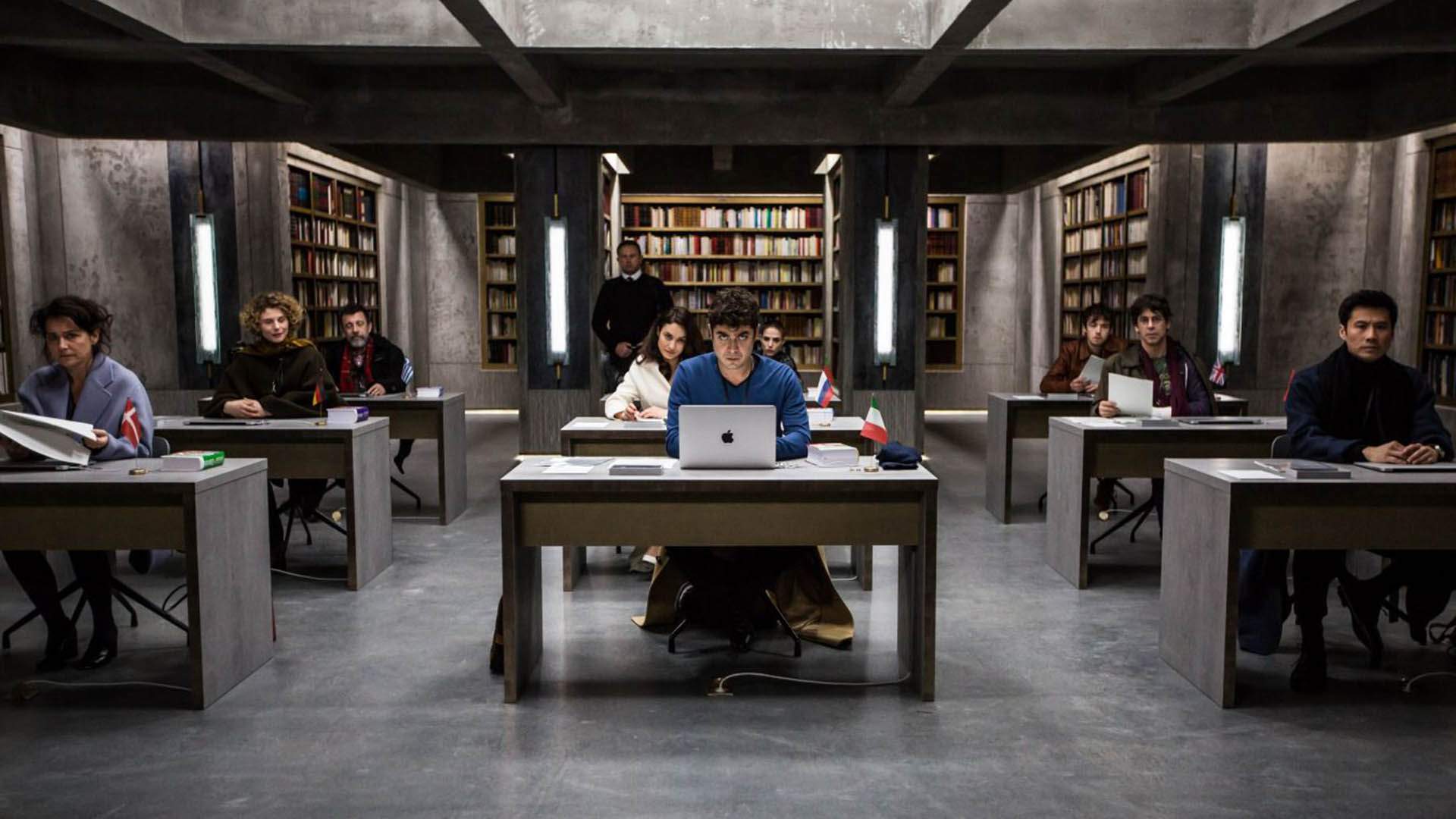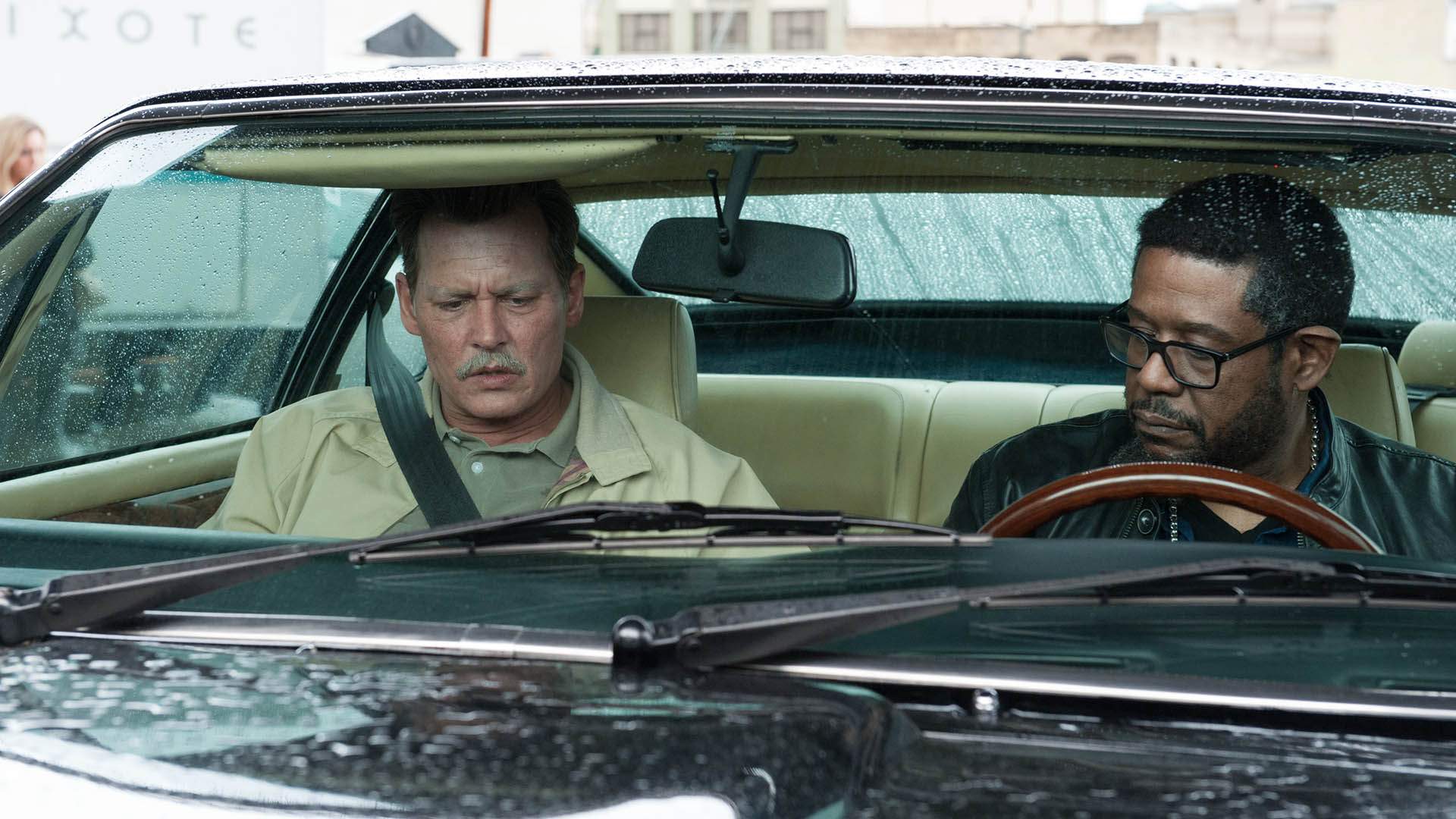The New Movies You Can Watch at Melbourne Cinemas From November 26
Head to the flicks to see a queer festive rom-com, a masterpiece of a concert movie and a horror film that isn't easily forgotten.
It has finally happened, Melburnians. After two prolonged periods spent empty this year, with projectors silent, theatres bare and the smell of popcorn fading, Melbourne picture palaces are back in business.
During COVID-19 lockdowns, no one was short on things to watch, of course. In fact, you probably feel like you've streamed every movie ever made over the past three months, including new releases, comedies, music documentaries, Studio Ghibli's animated fare and Nicolas Cage-starring flicks. But, even if you've spent all your time of late glued to your small screen, we're betting you just can't wait to sit in a darkened room and soak up the splendour of the bigger version. Thankfully, plenty of new films are hitting cinemas so that you can do just that — and we've rounded up, watched and reviewed everything on offer from this week.
HAPPIEST SEASON
Heading home for the holidays and stepping into a sea of interpersonal dramas is a familiar on-screen set-up, as a new movie every Christmas or so reminds us. By now, then, we all know the formula. Adult children make the pilgrimage to their parents' place, rivalries and animosities flare up, secrets are spilled, chaos ensues and, by the end of the film's running time, everyone has learned something. Happiest Season fits the template perfectly. With the merriest time of the year in full swing, the Caldwells converge on the Pennsylvanian family home, with their celebrations given an extra edge due to patriarch Ted's (Victor Garber, Dark Waters) mayoral campaign. His fastidious wife Tipper (Mary Steenburgen, The Book Club) insists on snapping every moment for his Instagram feed, all as stern eldest daughter Sloane (Alison Brie, GLOW) arrives with her husband (Burl Moseley, Crazy Ex-Girlfriend), two children (Asiyih and Anis N'Dobe) and plenty of unspoken tension in tow; zany middle sister and aspiring fantasy writer Jane (Mary Holland, Between Two Ferns: The Movie) is largely ignored; and Pittsburgh-based political journalist Harper (Mackenzie Davis, Irresistible) returns with the girlfriend, Abby (Kristen Stewart, Charlie's Angels), that none of her relatives know about because she hasn't come out to them yet.
If someone other than The Faculty, Girl, Interrupted, Veep and The Handmaid's Tale actor-turned-filmmaker Clea DuVall had made Happiest Season, the above paragraph would accurately reflect the feature's character hierarchy — because Sloane would take centre stage, and Harper and Abby would hover around the narrative's edges. But DuVall did make Happiest Season and, with co-writer Holland, she flips the movie's focus, even while still sticking with a well-worn general premise. Accordingly, this festive flick resembles a comfy sweater that often gets a wear, but seems welcomely different on this particular occasion. It shouldn't be so subversive to take an overused genre that's heavy on recognisable tropes, then strip away the engrained heteronormativity, but it is. Amid the sibling struggles, the re-emergence of old flames both male (Jake McDorman, What We Do in the Shadows) and female (Aubrey Plaza, Parks and Recreation), and the always hectic whirlwind that surrounds every seasonal family affair — and every attempt to run for political office, too — Happiest Season also explores two crucial themes in a meaningful way. First, it unpacks the performative nature of human existence, where too often we're all trying to match other people's perceptions and expectations without consistently remaining true to ourselves. And, it also interrogates how coming out isn't a simple or straightforward act, even in seemingly loving circumstances.
Read our full review.

AMERICAN UTOPIA
There may be no catchier lyric in music history than "same as it ever was", the five words repeated in Talking Heads' 1981 single 'Once in a Lifetime'. As uttered again and again by the band's inimitable frontman David Byrne, it's a looping phrase that burrows into your skull and never leaves. So when American Utopia opens with the musician sat at a table holding a brain and talking about what its various parts do, it feels as if Byrne is acknowledging what everyone already knows in the deepest recesses of their consciousness: that Byrne long ago got cosy in our craniums and has been nattering away to us ever since. As he stares at grey matter while wearing a grey suit — a perfectly fitting one, unlike the famed big number he wore in iconic 1984 Talking Heads concert film Stop Making Sense — he has something else on his mind, however. American Utopia starts with the part of our bodies where we all mentally reside, but slowly and smartly evolves from the cerebral to the communal. It segues from one man alone on a stage lost in his own thoughts to 12 people singing, dancing, playing instruments and connecting, and also pondering the state of the world and how to better it in the process. And it takes its titular concept seriously along the way, confronting America's political and social divisions in Byrne's witty, wise and impassioned between-song chats, but never satirising the idea that the US could be improved to the benefit of everyone.
American Utopia is a concert film like its predecessor but, as that masterpiece proved, the whole notion means more to Byrne than merely standing in front of a camera and busting out well-known hits.From the sublimely soothing 'This Must Be the Place (Naive Melody)' to the punchier 'Burning Down the House', plenty of Byrne's best-known songs do grace American Utopia. 'Once in a Lifetime' is among them, of course, as are 'Road to Nowhere' and 'Everybody's Coming to My House', with the film's playlist spanning his career with Talking Heads and solo. Across a range of styles and tempos, each track is a wonder, and not just in the way that fans already know. As should be obvious from the way in which Byrne has conceptualised this stage performance — which he toured in 2018, then adapted for Broadway in 2019, and has now turned into this standout movie directed by Spike Lee — this is a meticulously crafted work. Basking in the glory of Byrne and his band is inevitable and would happen regardless, but soaking in everything that American Utopia does is another marvel entirely. Before the film forces you to do so, you probably won't have realised how enlivening, wondrous and cathartic it is to see the act of connecting so firmly thrust to the fore. It takes an incredible amount of work to make something so tightly constructed seem so loose and natural, and that's just one of the reasons that American Utopia is yet another of the star's masterpieces.
Read our full review.

POSSESSOR
In Possessor, technology permits assassins to hijack the bodies of people close to their targets, letting them assume not just their identities but their physical presence to fulfil their murderous missions. Tasya Vos (Andrea Riseborough, The Grudge) is one such killer, and she is so exacting and accomplished at her job that her no-nonsense boss and handler Girder (Jennifer Jason Leigh, Annihilation) keeps trying to push her further. Such work comes with consequences, though, with Tasya slowly estranging herself from her husband (Rossif Sutherland, Catastrophe) and young son (Gage Graham-Arbuthnot, Becky). During the luridly shot undertaking that opens the movie and the assignment that the often neon-hued flick spends the bulk of its time on, Tasya also begins to realise that separating herself from the folks she's temporarily inhabiting is becoming difficult. In the first job, Tasya's consciousness takes over a woman called Holly (Gabrielle Graham, On the Basis of Sex) to gun down a high-flying lawyer at a swanky hotel party. Every mission should end with extraction via suicide — the possessed person's, as forced by the possessor, who then returns to their own bag of bones, flesh and blood — but Tasya can't pull the trigger on her host body. When she's later sent into Colin (Christopher Abbott, Vox Lux), the fiancé of the daughter (Tuppence Middleton, Mank) of a ruthless business mogul (Sean Bean, Snowpiercer), she similarly struggles to retain control.
As depicted in gory detail, being able to stick a probe into your head and mind-hop into someone else's may be pure science fiction, but writer/director Brandon Cronenberg intentionally apes The Matrix when he shows how the tech behind his premise operates. Our present analogues to Possessor's body-jumping concept exist in the online world, virtual reality, avatars, catfishing, trolling and even just anonymous commenting while you're tapping at your keyboard or phone, and this film makes it ferociously clear that it all has a significant cost. Cronenberg isn't just taking cues from his father David — whose 1999 film eXistenZ, also starring Jason Leigh, toyed in somewhat similar territory — or from a beloved sci-fi franchise. As many works that reflect upon humanity's true nature via dystopian futures tend to, the writer/director adds an entry to both the body horror and science fiction canons that seems like it might've appeared in a feverish dream after a life spent consuming those exact types of tales. But Possessor also always feels like a unique creation, and never a film puppeteered by its influences in the same way that Tasya pulls the strings of her marks. Cronenberg's feature boasts far too much of its own chilliness, daring and determination, as well as the filmmaker's fondness for particularly gruesome imagery, to merely be the sum of its various sources of inspiration. Possessor also has its own wellspring of nihilism pumping through its veins, not only tackling big notions in a bold and ultra-violent way, but proving deeply, gut-wrenchingly, existentially dark.
Read our full review.

MISBEHAVIOUR
The fact that it took 50 years to bring Misbehaviour's true tale to the screen is nothing less than remarkable. Following the protests staged by the women's liberation movement at the 1970 Miss World Pageant in London, it harks back to a noteworthy and important chapter of history — so much so that you would've expected filmmakers to have been clamouring to give it the cinematic treatment. A plethora of compelling topics are baked into this story, after all, including calling out the gross sexism inherent in objectifying women and ascribing their worth according to their looks, questioning society's narrow view of beauty and making plain the racial prejudice that's also frequently in play. But you don't need a movie about all of the above to tell you the obvious, and also the reason that a film about this incident hasn't existed until now. Much may have changed in the past half-century, but the feminist quest for recognition, fairness and equality in every way isn't over yet. Indeed, it's galling how many of Misbehaviour's observations about the way women are treated — and how women of colour fare on top of that — continue to ring true in 2020.
Director Philippa Lowthorpe (Swallows and Amazons) and screenwriters Rebecca Frayn (The Lady) and Gaby Chiappe (Their Finest) are eager to pay tribute to pioneering feminists, but they're also very keen to make a feel-good, cheer-inducing movie that fits a clear formula. So it is that a seemly mismatched group comes together, united by the shared goal of improving how women are regarded by society, and decides to target the giant, glitzy and televised spectacle that is the Miss World Pageant — which 100 million people will watch. The two main instigators, aspiring history academic Sally Alexander (Keira Knightley, Official Secrets) and graffiti-spraying anarchist Jo Robinson (Jessie Buckley, I'm Thinking of Ending Things), are initially worlds apart, but squaring off against a common enemy has a way of bringing people together. Also earning the film's attention: contestant Jennifer Hosten (Gugu Mbatha-Raw, Farming), pageant founder Eric Morley (Rhys Ifans, Berlin Station) and the year's host Bob Hope (Greg Kinnear, Strange But True). The result is a rousing, overt and easy movie that ticks all the boxes it has placed on its own checklist, but doesn't do anything more — and it definitely could. Getting caught up in Misbehaviour's plot, purpose and impressively staged climax is almost a foregone conclusion. Being happy that it's hitting screens and telling this tale at all after all of these years is as well. But so is knowing that this is the most standard and clearcut rendering of this story possible.
Read our full review.

LET HIM GO
Hell hath no fury like a grieving mother and grandmother in Let Him Go, an involving drama that shows that few actors can convey quiet anger and unflinching determination quite like Diane Lane. The Unfaithful and Under the Tuscan Sun star plays Margaret Blackledge, a Montana rancher with a way with horses, and with strong, silent ex-sheriff George (Kevin Costner, Yellowstone) for a husband. Soon after the family's rural idyll is first established, she not only loses her adult son (Ryan Bruce) to a tragic accident but, just a couple of years later, is shocked to discover that her newly remarried daughter-in-law Lorna (Kayli Carter, Bad Education) has left the local town in a hurry one night with Margaret's three-year-old grandson Jimmy (Bram and Otto Hornung). Determined not to see more of her family members ripped away, she convinces George that they should set off on their trail. Complicating their plans is he fact that Lorna has wed into the Weboys, who hold significant — and criminal — influence over their patch of America's north. As the Blackledges learn after finally tracking down their new relatives-via-nuptials, brash Weboy matriarch Blanche (Lesley Manville, Misbehaviour) isn't keen to relinquish her claim on the only link Margaret has left to her dearly departed child.
Adapted by writer/director Thomas Bezucha (screenwriter of 2018's The Guernsey Literary and Potato Peel Pie Society) from the novel of the same name, Let Him Go follows a straightforward narrative with a smattering of hits and misses — but its two main female roles are so superbly cast, and the film's handling of tension so finely tuned, that it proves gripping for the bulk of its running time. The last time that Bezucha dabbled with complicated family antics, in 2005's The Family Stone, he was in far lighter territory; however, he's more than adept at handling the fierce confrontations, simmering and overt suspense, and pulpy revenge-fuelled setpieces that are pivotal here. And, he does so in a fittingly pared back but forceful manner; Let Him Go takes its time and doles out only the necessary details, butt does so with maximum emotional impact in mind. While Costner is also solid as a man trying to deal with his own heartache and disappointment in his own way, and Booboo Stewart (The Twilight Saga) leaves a lasting impression as a Native American teen the Blackledges cross paths with on their journey, Let Him Go is at its best when it cedes the screen to the potent Lane and the gloriously overt Manville.

CORPUS CHRISTI
No one wants to live in a world where Parasite, the best movie of 2019, doesn't exist. But if it didn't for some reason, it's highly likely that Corpus Christi would've been this year's Best International Feature Film Oscar winner, rather than just a nominee. This Polish drama also focuses on people pretending to be something they're not. As directed by Warsaw 44 and The Hater's Jan Komasa, and written by the latter's screenwriter Mateusz Pacewicz, it casts a wry eye over much about life in its homeland today, too. And it isn't afraid to call out hypocrisy, societal divisions and greed, either — literally, in the latter case, with its protagonist making a speech about it at the local sawmill. There are few other similarities between Corpus Christi and the movie it lost to, but perhaps the only one that really matters is how blisteringly and rousingly it unfurls its on-screen gifts. Well that, and how striking every second of the film looks, pairing its grey, hazy aesthetics with its complicated account of an ex-juvenile delinquent who poses as a small-town priest.
The imposter's name is Daniel and, as played with soulful intensity by Bartosz Bielenia, he's a complex figure. First seen serving out the final days of his reform school sentence, he has made a fan out of the facility's head priest Father Tomasz (Lukasz Simlat). In fact, if his criminal record didn't preclude it, he'd follow in the elder man's footsteps and join the seminary. Instead, he's released to work in a sawmill. Through a series of events that never feels convenient or strained, however, he's soon welcomed by the locals as their new spiritual advisor. Daniel genuinely has faith and believes in his task, so the jump from playing lookout as his fellow inmates dispense a brutal beating to endeavouring to help his congregation is easy. Loosely inspired by real-life details, Corpus Christi gifts its young protagonist an unexpected second chance — and an unlikely opportunity to follow his heart and make a difference to an insular community — but he's not the only figure within its frames with a troubled past to overcome. As a film about a masquerading cleric, tension and foreboding seethes through every second, but it's the bubbling and brooding movie's contemplation of what redemption and benevolence really means that hits the most potent notes.
Read our full review.

THE TRANSLATORS
Like Agatha Christie and Knives Out before them, the makers of The Translators know that a good whodunnit serves up two major joys. That'd be the puzzle and the journey — because whichever intriguing narrative is being thrust their way, audiences want to sleuth along with the characters, piecing clues together in their heads; and, they want to enjoy each and every one of the story's many ins, outs, twists and turns as all the details unravel, too. In fact, this French film embraces those truths heartily. Writer/director Régis Roinsard (Populaire) and his co-scribes Romain Compingt and Daniel Presley even go a little heavy on convoluted minutiae and attempts to keep everyone guessing. Still, they mostly deliver an entertaining thriller — and, as always proves the case in this genre, if you enjoy the game and the ride enough once, it doesn't really matter if you won't be clamouring for a second helping
The Translators' premise is killer — in a film that doesn't shy away from a body count, but is actually more concerned with stolen pages from the yet-to-be-released last book in the bestselling The Man Who Did Not Want to Die series. The latest novel has only been seen by its secretive author, arrogant French publisher Eric Angstrom (Lambert Wilson, The Odyssey) and the nine translators the latter has assembled to prepare the text in multiple languages for a simultaneous worldwide debut. The enlisted team of experts are working in a bunker under stringent conditions, however, so when Angstrom receives an email threatening to leak the new book unless a huge ransom is paid, he's both perplexed and angry. Also starring Olga Kurylenko (The Man Who Killed Don Quixote) as a Russian translator who purposely dresses to resemble the fated heroine in the novel the group is working on, as well as Alex Lawther (The End of the F***ing World) as a noticeably young Brit, The Translators isn't big on depth but still keeps viewers engaged. Hurtling forward like someone furiously thumbing through an airport novel, and offering a slick, swift-moving affair that ticks all the whodunnit basics (even as it gets a little too carried away with the exaggerated drip-fed clues, surprise reveals and reversals) will do that.
Read our full review.

CITY OF LIES
It has been almost a quarter-century since Tupac Shakur and Christopher Wallace (aka the Notorious BIG/Biggie Smalls) were gunned down in separate incidents within six months of each other — and, over that time, fewer films about either or both have reached screens than one might expect. Known not only for their music but for being the focal points of the supposed East Coast-West Coast hip hop feud, the pair's plights have inspired exactly zero worthwhile movies, though, and that includes the long-delayed City of Lies. Based on the non-fiction book LAbyrinth by Randall Sullivan, this conspiracy thriller views the deaths of two of the 90s' biggest stars through the efforts of LAPD detective Russell Poole. There is real-life grounds for that angle, and the on-screen Poole (Johnny Depp) is constantly noting and fighting against the racial prejudice that existed in the Los Angeles police department at a time just after the Rodney King assault, trial and riots, as well as the OJ Simpson case. But there's no escaping the fact that the film approaches some of the most momentous events in rap history through a white cop.
In 1997, Poole is assigned to another shooting — of a black officer by a white officer — just days after Notorious BIG's death. Soon, however, his investigation of the former leads him to the latter, and to the conclusion that the LA police were involved in killing Biggie, all as his superiors demand he ignore the evidence. Decades later, long after he has resigned from being a cop, a journalist (Forest Whitaker) wanders into Poole's apartment for a 20-year piece on the rapper's murder — and the writer might've been accused of dredging up the past if Poole's walls weren't covered in case details and materials. Where director Brad Furman turned legal thriller The Lincoln Lawyer into a slick and entertaining affair, almost everything about City of Lies is misjudged, and it drags on rather than drawing viewers into its theories or even the cases it covers. Depp plays crusading but hard done by with little discernible effort, and the decision to film the movie's 90s scenes with the same type of hues and lighting usually reserved for 70s-set features smacks of the same. And while Whitaker is the best thing about City of Lies, his determined performance isn't enough to salvage the film.
If you're wondering what else is currently screening around Melbourne, we've also picked the 12 best flicks that started gracing the city's silver screens when indoor cinemas were given the green light to reopen. When outdoor cinemas relaunched before that, we outlined the films showing under the stars, too. And, we've run through all the pictures that opened in the city on November 12 and November 19 as well.
You can also read our full reviews of The Personal History of David Copperfield, Waves, The King of Staten Island, Babyteeth, Deerskin, Peninsula, Les Misérables, Bill & Ted Face the Music, An American Pickle, On the Rocks, Antebellum, Kajillionaire, The Craft: Legacy, Never Rarely Sometimes Always, Radioactive, Brazen Hussies, Freaky, Mank, Monsoon and Ellie and Abbie (and Ellie's Dead Aunt) all of which are presently showing in Melbourne.
And, you can check out our rundowns of the new films that released in other cities over the past few months — on July 2, July 9, July 16, July 23 and July 30; August 6, August 13, August 20 and August 27; September 3, September 10, September 17 and September 24; October 1, October 8, October 15, October 22 and October 29; and November 5 — as a number of those movies are now showing in Melbourne as well.
